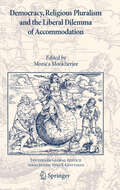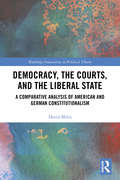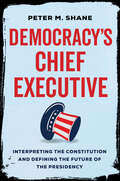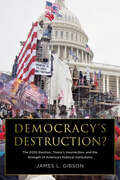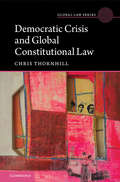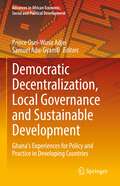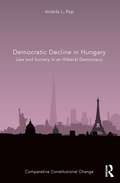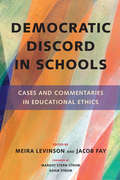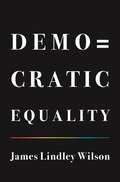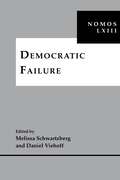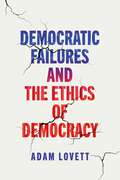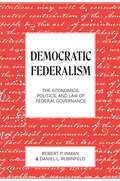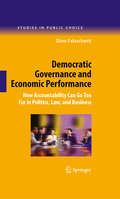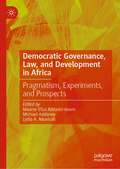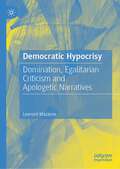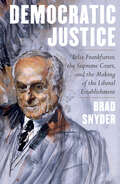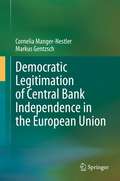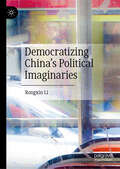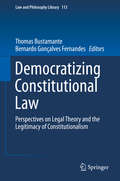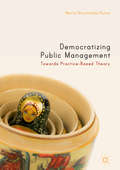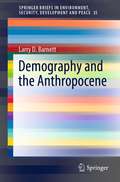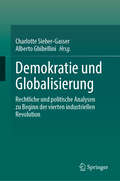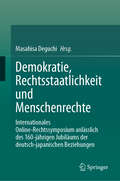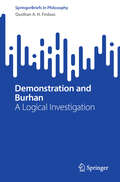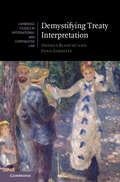- Table View
- List View
Democracy, Religious Pluralism and the Liberal Dilemma of Accommodation
by Monica MookherjeeHow should liberal democratic governments respond to citizens as religious believers whose values, norms and practices might lie outside the cultural mainstream? Some of the most challenging political questions arising today focus on the adequacy of a policy of 'live and let live' liberal toleration in contexts where disputes about the metaphysical truth of conflicting world-views abound. Does liberal toleration fail to give all citizens their due? Do citizens of faith deserve a more robust form of accommodation from the state in the form of 'recognition'. This issue is far from settled. Controversies over the terms of religious accommodation continue to dominate political agendas around the world. This is the first edited collection to provide a sustained examination of the politics of toleration and recognition in an age of religious pluralism. The aftermath of the events of September 11th have dramatised the urgency of this debate. It has also surfaced, nationally and globally, in disputes about terrorism, security and gender and human rights questions in relation to minority communities. This volume brings together a group of new and established scholars from the fields of law and philosophy, who all present fresh and challenging perspectives on an urgent debate. It will be indispensable reading for advanced researchers in political and legal philosophy, religious and cultural studies and related disciplines.
Democracy, the Courts, and the Liberal State: A Comparative Analysis of American and German Constitutionalism (Routledge Innovations in Political Theory)
by David MilesReformulating a problem of both constitutionalism and liberalism discussed in the works of Ernst-Wolfgang Böckenförde, Hannah Arendt, and Alexis de Tocqueville, the book examines one generally overlooked manifestation of constitutionalism: the role of the courts in shaping democratic politics and the inter-relationship between citizens and state. Drawing on constitutional history, law, and political theory, David Miles argues that constitutionalism cannot be seen merely as an institutional mechanism to limit government, as it also has a crucial civic dimension upon which the liberal state depends. Utilising the works of Böckenförde, Arendt, and Tocqueville, constitutionalism is conceived in the book as part of a broader system of communal norms which sustains representative democracy and liberalism. Through an analysis of judicial interventions in the electoral processes of the United States and Germany, Miles explores the role of civil society actors in transforming constitutionalism through legal challenges to oligarchical or exclusionary practices. He assesses how, in adjudicating these cases, the US Supreme Court and the German Constitutional Court have mediated the tension between threats to stability and the imperative of democratic renewal. Democracy, the Courts, and the Liberal State will be of interest to scholars, students, and practitioners interested in comparative politics, political theory, and constitutional law and history.
Democracy’s Chief Executive: Interpreting the Constitution and Defining the Future of the Presidency
by Peter M ShaneLegal scholar Peter M. Shane confronts U.S. presidential entitlement and offers a more reasonable way of conceptualizing our constitutional presidency in the twenty-first century. In the eyes of modern-day presidentialists, the United States Constitution’s vesting of "executive power" means today what it meant in 1787. For them, what it meant in 1787 was the creation of a largely unilateral presidency, and in their view, a unilateral presidency still best serves our national interest. Democracy’s Chief Executive challenges each of these premises, while showing how their influence on constitutional interpretation for more than forty years has set the stage for a presidency ripe for authoritarianism. Democracy’s Chief Executive explains how dogmatic ideas about expansive executive authority can create within the government a psychology of presidential entitlement that threatens American democracy and the rule of law. Tracing today’s aggressive presidentialism to a steady consolidation of White House power aided primarily by right-wing lawyers and judges since 1981, Peter M. Shane argues that this is a dangerously authoritarian form of constitutional interpretation that is not even well supported by an originalist perspective. Offering instead a fresh approach to balancing presidential powers, Shane develops an interpretative model of adaptive constitutionalism, rooted in the values of deliberative democracy. Democracy’s Chief Executive demonstrates that justifying outcomes explicitly based on core democratic values is more, not less, constraining for judicial decision making—and presents a model that Americans across the political spectrum should embrace.
Democracy’s Destruction? Changing Perceptions of the Supreme Court, the Presidency, and the Senate after the 2020 Election: Changing Perceptions of the Supreme Court, the Presidency, and the Senate after the 2020 Election
by James L. GibsonOn January 6, 2021, an angry mob stormed the U.S. Capitol in an attempt to overturn the results of the 2020 presidential election. This assault on America’s democratic system was orchestrated by then President Donald Trump, abetted by his political party, and supported by a vocal minority of the American people. Did denial of the election results and the subsequent insurrection inflict damage on American political institutions? While most pundits and many scholars say yes, they have offered little rigorous evidence for this assertion. In Democracy’s Destruction? political scientist James L. Gibson uses surveys from representative samples of the American population to provide a more informed answer to the question. Focusing on the U.S. Supreme Court, the presidency, and the U.S. Senate, Gibson reveals that how people assessed the election, the insurrection, and even the second Trump impeachment has little connection to their willingness to view American political institutions as legitimate. Instead, legitimacy is grounded in more general commitments to democratic values and support for the rule of law. On most issues of institutional legitimacy, those who denied the election results and supported the insurrection were not more likely to be alienated from political institutions and to consider them illegitimate. Gibson also investigates whether Black people might have responded differently to the events of the 2020 election and its aftermath. He finds that in comparison to the White majority, Black Americans were less supportive of America’s democratic institutions and of democratic values, such as reverence for the rule of law, because they often have directly experienced unfair treatment by legal authorities. But he emphasizes that the actions of Trump and his followers are not the cause of those weaker commitments. Democracy’s Destruction? offers rigorous analysis of the effect of the Trump insurrection on the state of U.S. democracy today. While cautioning that Trump and many Republicans may be devising schemes to subvert the next presidential election more effectively, the book attests to the remarkable endurance of American political institutions.
Democratic Crisis and Global Constitutional Law (Global Law Series)
by Christopher ThornhillDemocratic Crisis and Global Constitutional Law explains the current weakness of democratic polities by examining antinomies in constitutional democracy and its theoretical foundations. This book argues that democracy is usually analysed in a theoretical lens that is not adequately sensitive to its historical origins. The author proposes a new sociological framework for understanding democracy and its constitutional preconditions, stressing the linkage between classical patterns of democratic citizenship and military processes and arguing that democratic stability at the national level relies on the formation of robust normative systems at the international level. On this basis, he argues that democracy is frequently exposed to crisis because the normative terms in which it is promoted and justified tend to simplify its nature. These terms create a legitimising space in which anti-democratic movements, typically with a populist emphasis, can take shape and flourish.
Democratic Decentralization, Local Governance and Sustainable Development: Ghana's Experiences for Policy and Practice in Developing Countries (Advances in African Economic, Social and Political Development)
by Prince Osei-Wusu Adjei Samuel Adu-GyamfiDrawing on field-based data and experiences from the practice of democratic decentralization and local governance over the last three decades in Ghana, this book examines whether and how democratic decentralization and local governance reforms in developing countries have produced the anticipated development outcomes.In seventeen related contributions, the authors present four relevant focal themes, including conceptual and historical trajectories of decentralization and local governance; institutional choice, democratic representation, and poverty reduction; local governance, resource capacity, and service delivery; and non-state actors, local governance and sustainable development. The book blends perspectives of scholars, practitioners, and policy-makers to provide a holistic analysis of linkages between decentralization, local governance, and sustainable development efforts, presenting a novel and useful guide for science, policy, and practice of bottom-up governance and development. It provides relevant lessons and experiences for scholars, policy-makers, and development practitioners in Africa in particular and developing countries in general.
Democratic Decline in Hungary: Law and Society in an Illiberal Democracy (Comparative Constitutional Change)
by András L. PapThis book shows the rise and morphology of a self-identified `illiberal democracy’, the first 21st century illiberal political regime arising in the European Union. Since 2010, Viktor Orbán’s governments in Hungary have convincingly offered an anti-modernist and anti-cosmopolitan/anti-European Unionist rhetoric, discourse and constitutional identity to challenge neo-liberal democracy. The Hungarian case provides unique observation points for students of transitology, especially those who are interested in states which are to abandon pathways of liberal democracy. <P><P>The author demonstrates how illiberalism is present both in `how’ and `what’ is being done: the style, format and procedure of legislation; as well as the substance: the dismantling of institutional rule of law guarantees and the weakening of checks and balances. The book also discusses the ideological commitments and constitutionally framed and cemented value preferences, and a reconstituted and re-conceptualized relationship between the state and its citizens, which is not evidently supported by Hungarians’ value system and life-style choices.
Democratic Discord in Schools: Cases and Commentaries in Educational Ethics
by Meira Levinson and Jacob FayTeaching in a democracy is challenging and filled with dilemmas that have no easy answers. For example, how do educators meet their responsibilities of teaching civic norms and dispositions while remaining nonpartisan? Democratic Discord in Schools features eight normative cases of complex dilemmas drawn from real events designed to help educators practice the type of collaborative problem solving and civil discourse needed to meet these challenges of democratic education. Each of the cases also features a set of six commentaries written by a diverse array of scholars, educators, policy makers, students, and activists with a range of political views to spark reflection and conversation. Drawing on research and methods developed in the Justice in Schools project at the Harvard Graduate School of Education (HGSE), Democratic Discord in Schools provides the tools that allow educators and others to practice the deliberative skills they need in order to find reasonable solutions to common ethical dilemmas in politically fraught times.
Democratic Equality
by James Lindley WilsonDemocracy establishes relationships of political equality, ones in which citizens equally share authority over what they do together and respect one another as equals. But in today's divided public square, democracy is challenged by political thinkers who disagree about how democratic institutions should be organized, and by antidemocratic politicians who exploit uncertainties about what democracy requires and why it matters. Democratic Equality mounts a bold and persuasive defense of democracy as a way of making collective decisions, showing how equality of authority is essential to relating equally as citizens.James Lindley Wilson explains why the US Senate and Electoral College are urgently in need of reform, why proportional representation is not a universal requirement of democracy, how to identify racial vote dilution and gerrymandering in electoral districting, how to respond to threats to democracy posed by wealth inequality, and how judicial review could be more compatible with the democratic ideal. What emerges is an emphatic call to action to reinvigorate our ailing democracies, and a road map for widespread institutional reform.Democratic Equality highlights the importance of diverse forms of authority in democratic deliberation and electoral and representative processes—and demonstrates how that authority rests equally with each citizen in a democracy.
Democratic Failure: NOMOS LXIII (NOMOS - American Society for Political and Legal Philosophy #35)
by Melissa Schwartzberg Daniel ViehoffExplores the challenges facing democracies in the twenty-first centuryIn Democratic Failure, Melissa Schwartzberg and Daniel Viehoff bring together a distinguished group of interdisciplinary scholars in political science, law, and philosophy to explore the key questions and challenges facing democracies, both in the past and present, around the world.In ten timely essays, contributors examine the fascinating, centuries-old question of whether or not democracy can ever fulfill the promise of its ideals. Together, they explore lessons from the history of democracy, various failures of democratic representation, and more. Ultimately, this latest installment of the NOMOS series provides thought-provoking insights into how we conceptualize, measure, and address democratic erosion in our present-day world.
Democratic Failures and the Ethics of Democracy (Democracy, Citizenship, and Constitutionalism)
by Adam LovettIn Democratic Failures and the Ethics of Democracy, political philosopher Adam Lovett argues that when it comes to democratic ideals, the United States is a failed democracy. Specifically, he contends that American democracy has failed to advance equality and self-rule for its citizens—qualities he identifies as essential components of democracy’s intrinsic value. Drawing on rich empirical research, Lovett applies original philosophical analysis to reveal real-world democratic failures and evaluate their philosophical and ethical consequences.His research locates democratic failures at both the level of political elites and at the level of the masses. At the elite level, elected officials shape policy to prioritize the interests of their supporters, where wealthy individuals and corporations are the most influential. At the mass level, ordinary citizens are motivated to vote not to introduce specific policies but by party identification. By mapping how these failures erode equality and self-rule, he demonstrates that they in fact undermine the ethics of democracy itself. After all, Lovett argues, when a state fails to represent ordinary citizens, those ordinary citizens are not morally obligated to follow the laws of the state.Because the state fails to achieve democratic values in any meaningful way, its claim to political authority and legitimacy is diminished. However, Lovett does not conclude that American democracy is doomed—he instead proposes solutions from voting only on referendums to delegating aspects of public policy to unelected experts without partisan obligation. These reforms are vital for compelling the state to act on behalf of all citizens, not just the partisan or the powerful. Of interest to political scientists and political philosophers alike, Democratic Failures and the Ethics of Democracy sheds light on an increasingly troubled democratic ethos and proposes solutions for how ordinary citizens can work to save it.
Democratic Federalism: The Economics, Politics, and Law of Federal Governance
by Robert Inman Daniel L. RubinfeldAn authoritative guide to federal democracy from two respected experts in the fieldAround the world, federalism has emerged as the system of choice for nascent republics and established nations alike. In this book, leading scholars and governmental advisers Robert Inman and Daniel Rubinfeld consider the most promising forms of federal governance and the most effective path to enacting federal policies. The result is an essential guide to federalism, its principles, its applications, and its potential to enhance democratic governance.Drawing on the latest work from economics, political science, and law, Inman and Rubinfeld assess different models of federalism and their relative abilities to promote economic efficiency, encourage the participation of citizens, and protect individual liberties. Under the right conditions, the authors argue, a federal democracy—including a national legislature with locally elected representatives—can best achieve these goals. Because a stable union between the national and local governments is key, Inman and Rubinfeld also propose an innovative method for evaluating new federal laws and their possible impact on state and local governments. Finally, to show what the adoption of federalism can mean for citizens, the authors discuss the evolution of governance in the European Union and South Africa’s transition from apartheid to a multiracial democracy.Interdisciplinary in approach, Democratic Federalism brims with applicable policy ideas and comparative case studies of global significance. This book is indispensable for understanding the importance of federal forms of government—both in recent history and, crucially, for future democracies.
Democratic Governance and Economic Performance
by Dino FalaschettiConventional wisdom warns that unaccountable political and business agents can enrich a few at the expense of many. But logically extending this wisdom implies that associated principals - voters, consumers, shareholders - will favor themselves over the greater good when 'rules of the game' instead create too much accountability. Democratic Governance and Economic Performance rigorously develops this hypothesis, and finds statistical evidence and case study illustrations that democratic institutions at various governance levels (e.g., federal, state, corporation) have facilitated opportunistic gains for electoral, consumer, and shareholder principals. To be sure, this conclusion does not dismiss the potential for democratic governance to productively reduce agency costs. Rather, it suggests that policy makers, lawyers, and managers can improve governance by weighing the agency benefits of increased accountability against the distributional costs of favoring principal stakeholders over more general economic opportunities. Carefully considering the fundamentals that give rise to this tradeoff should interest students and scholars working at the intersection of social science and the law, and can help professionals improve their own performance in policy, legal, and business settings.
Democratic Governance, Law, and Development in Africa: Pragmatism, Experiments, and Prospects
by Michael Addaney Maame Efua Addadzi-Koom Lydia A. NkansahThis volume analyses democratic governance, the rule of law and development in Africa. It is unique and timely. First, the theme and sub-themes were carefully selected to solicit quality chapters from academics, practitioners and graduate students on topical and contemporary issues in constitutional law, human rights, and democratic governance in Africa. The chapters were subjected to a single-blind peer review by experts and scholars in the relevant fields to ensure that high quality submissions are included. Due to the dearth of knowledge and studies on the chosen thematic areas, the publication will remain relevant after several years due to the timeless themes it covers. In this regard, this edited volume audits the progress of democratic consolidation, rule of law and development in Ghana with selected case studies from other African countries. This book is intended for higher education institutions (universities, institutes and centres), public libraries, general academics, practitioners and students of law, democracy, human rights and political science, especially those interested in African affairs.
Democratic Hypocrisy: Domination, Egalitarian Criticism and Apologetic Narratives
by Leonard MazzoneUnconfessed by definition, hypocrisy is one of the most used and abused polemical categories, even today, to denounce the "masked cynicism" of certain social actors, especially when they hold public office. But has hypocrisy always been just that? Should we really always be wary of it and challenge its every manifestation? What forms of hypocrisy can we distinguish? What kind of relationship exists between hypocrisy and the lack of self-critical attitude of those who are used to challenge the conduct of others? And above all: what relationship exists between this common vice, democratic politics and the institutional reproduction of different forms of oppression and domination? These are just some of the questions that inspire this philosophical journey back into the history of one of the most chameleonic concepts of Western culture. In Mazzone’s conception, democratic hypocrisy includes argumentative strategies used by institutional actors to refuse any kind of responsibility when their decisions, actions or roles are called into question by the protests of citizens in a democratic context. He reveals the relationship that exists between such “apologetic narratives” and the institutional reproduction of different forms of oppression and domination. Ultimately, the book urges civic vigilance against underhand wannabe authoritarians, who – as a group – are evolving to find new ways to trick people into opposing democracy.
Democratic Justice: Felix Frankfurter, The Supreme Court, And The Making Of The Liberal Establishment
by Brad SnyderThe definitive biography of Felix Frankfurter, Supreme Court justice and champion of twentieth-century American liberal democracy. The conventional wisdom about Felix Frankfurter—Harvard law professor and Supreme Court justice—is that he struggled to fill the seat once held by Oliver Wendell Holmes. Scholars have portrayed Frankfurter as a judicial failure, a liberal lawyer turned conservative justice, and the Warren Court’s principal villain. And yet none of these characterizations rings true. A pro-government, pro-civil rights liberal who rejected shifting political labels, Frankfurter advocated for judicial restraint—he believed that people should seek change not from the courts but through the democratic political process. Indeed, he knew American presidents from Theodore Roosevelt to Lyndon Johnson, advised Franklin Roosevelt, and inspired his students and law clerks to enter government service. Organized around presidential administrations and major political and world events, this definitive biography chronicles Frankfurter’s impact on American life. As a young government lawyer, he befriended Theodore Roosevelt, Louis Brandeis, and Holmes. As a Harvard law professor, he earned fame as a civil libertarian, Zionist, and New Deal power broker. As a justice, he hired the first African American law clerk and helped the Court achieve unanimity in outlawing racially segregated schools in Brown v. Board of Education. In this sweeping narrative, Brad Snyder offers a full and fascinating portrait of the remarkable life and legacy of a long misunderstood American figure. This is the biography of an Austrian Jewish immigrant who arrived in the United States at age eleven speaking not a word of English, who by age twenty-six befriended former president Theodore Roosevelt, and who by age fifty was one of Franklin Roosevelt’s most trusted advisers. It is the story of a man devoted to democratic ideals, a natural orator and often overbearing justice, whose passion allowed him to amass highly influential friends and helped create the liberal establishment.
Democratic Legitimation of Central Bank Independence in the European Union
by Cornelia Manger-Nestler Markus GentzschThis short monograph examines the tense relationship between central bank independence and democratic legitimation, which has changed as the European Central Bank (ECB) has been entrusted with new tasks and faced unprecedented challenges. The financial and sovereign debt crisis, in particular, has affected the ECB's position within the Economic and Monetary Union without substantial changes in the Union's legal framework. However, the evolution of an institution primarily obligated to maintain price stability into an actor involved in sustaining financial stability, performing banking supervision and supporting economic policy raises the question of whether the high level of autonomy granted to the ECB is justified with regard to the principle of democracy that demands adequate accountability and control. This book identifies requirements for the democratic legitimation of central bank action in relation to specific tasks. Further, it analyses other scales of independence encountered in EU law in order to allow readers to gain a better conceptual understanding of central bank independence.
Democratizing China’s Political Imaginaries
by Rongxin LiThis book offers a meticulous empirical examination of Chinese democracy and its myriad discourses. Delving into the intricate workings of Chinese democracy, the author explores how the Chinese Communist Party employs democratic principles, how intellectuals grapple with the concept, and how the populace perceives and engages with democracy. In transcending mere methodological nationalism, this narrative extends to the global stage, offering insights into democratic evolution beyond Western paradigms by exploring resonates particularly with developing and post-colonial countries, offering a fresh perspective on the delicate balance between state capacity, social order, and the democratization process. While the trajectory of democracy in China remains uncertain, these empirically grounded analyses provide a pragmatic lens through which to contemplate the future of Chinese political dynamics.
Democratizing Constitutional Law
by Thomas Bustamante Bernardo Gonçalves FernandesThis volume critically discusses therelationship between democracy and constitutionalism. It does so with a view torespond to objections raised by legal and political philosophers who aresceptical of judicial review based on the assumption that judicial review is anundemocratic institution. The book builds on earlier literature on the moraljustification of the authority of constitutional courts, and on the currentattempts to develop a system on "weak judicial review". Although different intheir approach, the chapters all focus on devising institutions, proceduresand, in a more abstract way, normative conceptions to democratizeconstitutional law. These democratizing strategies may vary from a radicalobjection to the institution of judicial review, to a more modest proposal tojustify the authority of constitutional courts in their "deliberativeperformance" or to create constitutional juries that may be more aware of acommunity's constitutional morality than constitutional courts are. The book connects abstract theoreticaldiscussions about the moral justification of constitutionalism with concreteproblems, such as the relation between constitutional adjudication anddeliberative democracy, the legitimacy of judicial review in internationalinstitutions, the need to create new institutions to democratizeconstitutionalism, the connections between philosophical conceptions andconstitutional practices, the judicial review of constitutional amendments, andthe criticism on strong judicial review.
Democratizing Public Management: Towards Practice-Based Theory
by Marta Struminska-KutraThis book argues that contemporary society in general, and public administration specifically, can benefit from more reflexive learning processes through democracy and public involvement. It identifies the most central social practices, dilemmas, and challenges for public management as well as the mechanisms needed to enact institutional change. Offering a model of reflexivity and learning in the face of public dispute, it explores phenomena such as problem solving, democratization, public learning, and uncertainty to address certain tensions in governance theory and practice.Through a range of well-sourced case studies, this book demonstrates how institutions can manage difficult situations by not only resolving the conflict but addressing the underlying problem. It uses both theoretical and practical approaches to observe the micro foundations of political behavior and its institutional underpinnings, and will be a valuable resource for public administration researchers, practitioners, and graduate students seeking empirical studies of learning processes in the public sphere.
Demography and the Anthropocene (SpringerBriefs in Environment, Security, Development and Peace #35)
by Larry D. BarnettEnvironmentalists devote little attention at the moment to the size and growth of the human population. To counter this neglect, the monograph (i) includes original graphs showing population size and growth since 1920 in the world as a whole and the United States; (ii) assembles evidence tying the increasing number of people to ecosystem deterioration and its societal consequences; and (iii) analyzes sample-survey data to ascertain whether the current disregard of population pressures by U.S. environmentalists reflects the thinking of Americans generally. However, even if a nation took steps primarily intended to lower childbearing and immigration, the findings of social science research indicate that the steps would not have a substantial, lasting impact. The discussion, which suggests an indirect way by which government may reduce fertility, underlines for environmental scholars the importance of studying their subject in a multidisciplinary, collaborative setting.
Demokratie und Globalisierung: Rechtliche und politische Analysen zu Beginn der vierten industriellen Revolution
by Charlotte Sieber-Gasser Alberto GhibelliniDieses Buch bietet eine eingehende rechtliche und politische Analyse der Vereinbarkeit des westfälischen Staatsmodells mit der Globalisierung und der digitalen Revolution. Es untersucht das Konzept der Demokratie in einer globalisierten Welt, erörtert die Legitimität der wirtschaftlichen Integration in den globalen Markt und präsentiert drei Fallstudien (aus Brasilien, Taiwan und Spanien) über die Auswirkungen sozialer Medien auf Wahlen. Darüber hinaus werden neue Perspektiven zu den Auswirkungen der Digitalisierung auf nationale Grenzen und auf die Rolle von Bürgerinnen und Bürgern und Expertinnen und Experten bei der Gestaltung der Globalisierung aufgezeigt. Ein abschließendes Kapitel befasst sich mit der Frage, inwieweit die aus den Analysen der oben genannten Aspekte gewonnenen Erkenntnisse bei den Bemühungen um eine Überwindung der aktuellen globalen Gesundheits- und Wirtschaftskrise berücksichtigt werden müssen.
Demokratie, Rechtsstaatlichkeit und Menschenrechte: Internationales Online-Rechtssymposium anlässlich des 160-jährigen Jubiläums der deutsch-japanischen Beziehungen
by Masahisa DeguchiDas Buch basiert auf den Ergebnissen eines internationalen Online-Rechtssymposium anlässlich des 160-jährigen Jubiläums der deutsch-japanischen Beziehungen und setzt sich mit hochaktuellen Fragen zu Demokratie, Rechtsstaatlichkeit und Menschenrechten auseinander. Im ersten Teil steht die Gewährleistung der Grundrechte von Gläubigern und Schuldnern in der deutschen Zwangsvollstreckung sowie Frage- und Antwortrunden zwischen Wissenschaftlern und Praktikern aus der Perspektive des japanischen Zwangsvollstreckungsrechts im Mittelpunkt. In Teil 2 befassen sich Rechtswissenschaftlern und -praktikern aus Deutschland, Japan, Großbritannien und anderen Ländern mit der Bedeutung und den Problemen der Sportschiedsgerichtsbarkeit aus der Perspektive der grundlegenden Menschenrechte. Der dritte Teil behandelt die Corona-Pandemie aus verfassungsrechtlicher, zivilrechtlicher, strafrechtlicher, konkursrechtlicher und arbeitsrechtlicher Sicht. Im vierten Teil beschäftigen sich Rechtswissenschaftler und -praktiker aus Japan, Deutschland, Korea und den Niederlanden mit Fragen der Harmonisierung von Verfassungs- und Verfahrensgrundsätzen im Zuge der Digitalisierung von Zivilprozessen, die sich seit der Corona-Pandemie rasant ausgebreitet hat. Teil 5 geht abschließend auf die Bedeutung des vergleichenden Prozessrechts für die Entwicklung des Zivilprozessrechts in der Welt, sowohl aus theoretischer als auch aus praktischer Sicht ein.
Demonstration and Burhan: A Logical Investigation (SpringerBriefs in Philosophy)
by Qusthan A. FirdausThis book investigates the historical development of Aristotle’s perfect syllogism, or demonstration, into the Muslim world. It provides an accessible account to the modern reader, while at the same time bringing to the discussion the important issue of the specifically Muslim contribution to the field of logic. The author emphasizes the importance of axioms in establishing demonstration and the modern logic of dialetheia - Graham Priest’s idea of some true contradictions - in Islamic discourses. While Muslim philosophers have been claiming that demonstration is equal to burhan in mantiq or logic in Islamic education, this book presents the fact that burhan sets aside the necessity of axioms, making the former seem to be a deviation from Aristotle’s demonstration. The variety of Islamic philosophies has not been adequate enough to develop logic in Islamic education as progressive as its European counterparts. This book is an invitation to students and researchers to reconsider mantiq or logic in Islamic education based upon the Aristotelian logic and the modern logic of dialetheia, given that one cannot comprehend various Islamic discourses simply by exercising the Aristotelian principles of identity, non-contradiction, and excluded middle. In providing a useful overview of Aristotle before launching into a discussion on the various positions that Muslim scholars take regarding demonstration, the author presents a better framework for scholars and students in philosophy and religious studies to grasp several controversial and peculiar ideas in Islam.
Demystifying Treaty Interpretation (Cambridge Studies in International and Comparative Law #Series Number 188)
by Andrea Bianchi Fuad ZarbiyevDemystifying Treaty Interpretation doesn't just tell you how treaties are commonly interpreted. It helps you understand also the process of treaty interpretation and its outcomes. The idea that rules of treaty interpretation can guide us to the meaning of treaty provisions, in a simple and straightforward manner, is a myth to be dispelled. This book aims to capture some of the complex and nuanced processes involved in treaty interpretation. It spurs further reflection about how interpretation takes place against the background of concepts, categories, and insights from other disciplines. A useful tool for scholars, practitioners and researchers engaging with treaty interpretation at all levels, the book aims to enhance the reader's knowledge and mastery of the interpretive process in all its elements, with a view to making them more skilled and effective players in the game of interpretation.
